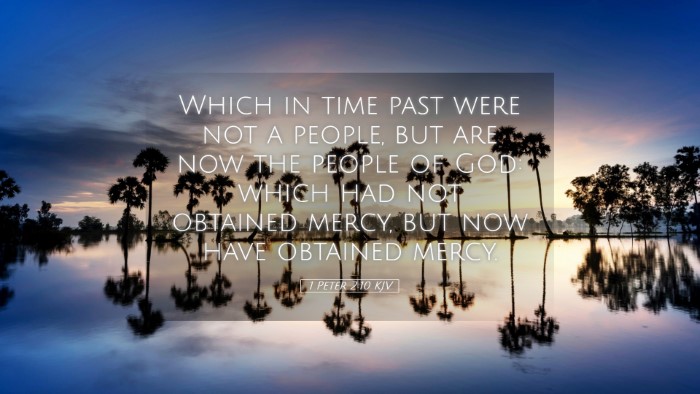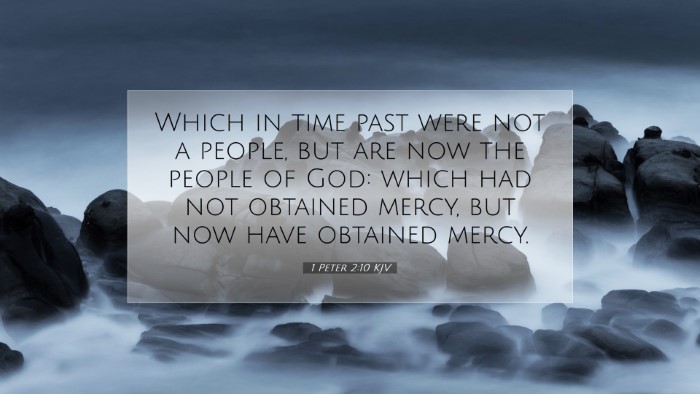Commentary on 1 Peter 2:10
The verse of 1 Peter 2:10 states: "Once you were not a people, but now you are the people of God; once you had not received mercy, but now you have received mercy." This concise declaration encapsulates the transformative nature of Christian faith and community.
Exegesis and Context
Contextual Background: The epistle of 1 Peter addresses Christians facing persecution and suffering for their faith. This verse serves as a rich reminder of their identity and belonging in Christ and highlights the profound change that faith brings in their lives.
Spiritual Identity: As per Matthew Henry, "the transition from being 'not a people' to 'the people of God' is profoundly significant." It marks a shift from isolation and alienation into a vibrant community under God's grace, fulfilling the promise made to Israel and extending it to all nations.
Theological Insights
Mercy and Grace: According to Albert Barnes, "the mention of mercy suggests the rich themes of divine compassion and pardon." It signals a reality wherein believers experience an unprecedented relationship with God, defined by grace rather than strict adherence to law.
God's mercy, bestowed upon those who once were in despair, underscores a vital theme for pastors and theologians who emphasize evangelism and community building. As Adam Clarke notes, "this mercy is not only a personal blessing but a communal reality, bringing together those once estranged."
Pastoral Application
Building Community: For modern-day pastors, this verse constitutes a foundational truth for church unity. Encouraging congregations to embrace their identity as "the people of God" fosters a communal sense where grace abounds.
- Recognizing believers as part of God's chosen community calls for inclusive practices and mutual love.
- This understanding can reshape church culture to focus on acceptance and reconciliation.
Doctrinal Significance
Universal Access: The declaration in 1 Peter 2:10 emphasizes that the access to God's people is universal, a truth expounded upon by Matthew Henry. He writes that "the Gospel does not restrict the identity of God's people to ethnic or cultural lines but invites all who believe."
Emphasis on Mercy: Clarke notes that "the concept of mercy is central to Christianity; it illustrates the effects of redemption in believers’ lives." This can serve as a vital teaching point on the importance of mercy in both personal conduct and community interactions.
Conclusion
In summary, 1 Peter 2:10 encapsulates a powerful message of transformation from exclusion to inclusion within God's family, emphasizing mercy as a cornerstone of identity. This verse not only serves as a theological declaration but also offers profound implications for pastoral care, community dynamics, and individual believer's lives.


